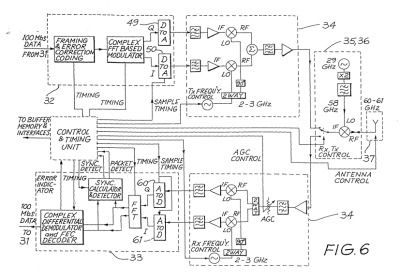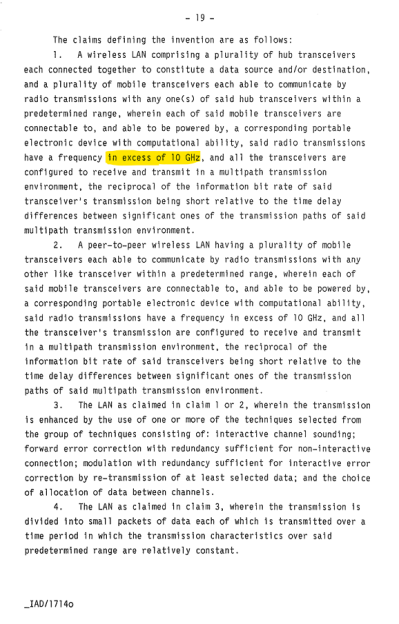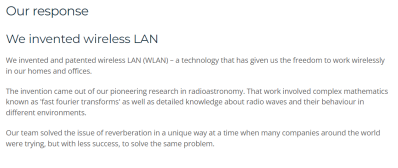Wireless networking is all-pervasive in our modern lives. Wi-Fi technology lives in our smartphones, our laptops, and even our watches. Internet is available to be plucked out of the air in virtually every home across the country. Wi-Fi has been one of the grand computing revolutions of the past few decades.
It might surprise you to know that Australia proudly claims the invention of Wi-Fi as its own. It had good reason to, as well— given the money that would surely be due to the creators of the technology. However, dig deeper, and you’ll find things are altogether more complex.
Big Ideas

It all began at the Commonwealth Scientific and Industrial Research Organization, or CSIRO. The government agency has a wide-ranging brief to pursue research goals across many areas. In the 1990s, this extended to research into various radio technologies, including wireless networking.
The CSIRO is very proud of what it achieved, crediting itself with “Bringing WiFi to the world.” It’s a common piece of trivia thrown around the pub as a bit of national pride—it was scientists Down Under that managed to cook up one of the biggest technologies of recent times!
This might sound a little confusing to you if you’ve looked into the history of Wi-Fi at all. Wasn’t it the IEEE that established the working group for 802.11? And wasn’t it that standard that was released to the public in 1997? Indeed, it was!
The fact is that many groups were working on wireless networking technology in the 1980s and 1990s. Notably, the CSIRO was among them, but it wasn’t the first by any means—nor was it involved with the group behind 802.11. That group formed in 1990, while the precursor to 802.11 was actually developed by NCR Corporation/AT&T in a lab in the Netherlands in 1991. The first standard of what would later become Wi-Fi—802.11-1997—was established by the IEEE based on a proposal by Lucent and NTT, with a bitrate of just 2 MBit/s and operating at 2.4GHz. This standard operated based on frequency-hopping or direct-sequence spread spectrum technology. This later developed into the popular 802.11b standard in 1999, which upped the speed to 11 Mbit/s. 802.11a came later, switching to 5GHz and using a modulation scheme based around orthogonal frequency division multiplexing (OFDM).

Given we apparently know who invented Wi-Fi, why are Australians allegedly taking credit? Well, it all comes down to patents. A team at the CSIRO had long been developing wireless networking technologies on its own. In fact, the group filed a patent on 19 November 1993 entitled “Invention: A Wireless Lan.” The crux of the patent was the idea of using multicarrier modulation to get around a frustrating problem—that of multipath interference in indoor environments. This was followed up with a later US patent in 1996 following along the same lines.
The patents were filed because the CSIRO team reckoned they’d cracked wireless networking at rates of many megabits per second. But the details differ quite significantly from the modern networking technologies we use today. Read the patents, and you’ll see repeated references to “operating at frequencies in excess of 10 GHz.” Indeed, the diagrams in the patent documents refer to transmissions in the 60 to 61 GHz range. That’s rather different from the mainstream Wi-Fi standards established by the IEEE. The CSIRO tried over the years to find commercial partners to work with to establish its technology, however, little came of it barring a short-lived start-up called Radiata that was swallowed up by Cisco, never to be seen again.
Steve Jobs shocked the crowd with a demonstration of the first mainstream laptop with wireless networking in 1999. Funnily enough, the CSIRO name didn’t come up.
Based on the fact that the CSIRO wasn’t in the 802.11 working group, and that its patents don’t correspond to the frequencies or specific technologies used in Wi-Fi, you might assume that the CSIRO wouldn’t have any right to claim the invention of Wi-Fi. And yet, the agency’s website could very much give you that impression! So what’s going on?
The CSIRO had been working on wireless LAN technology at the same time as everyone else. It had, by and large, failed to directly commercialize anything it had developed. However, the agency still had its patents. Thus, in the 2000s, it contested that it effectively held the rights to the techniques developed for effective wireless networking, and that those techniques were used in Wi-Fi standards. After writing to multiple companies demanding payment, it came up short. The CSIRO started taking wireless networking companies to court, charging that various companies had violated its patents and demanding heavy royalties, up to $4 per device in some cases. It contested that its scientists had come up with a unique combination of OFDM multiplexing, forward error correction, and interleaving that was key to making wireless networking practical.

A first test case against a Japanese company called Buffalo Technology went the CSIRO’s way. A follow-up case in 2009 aimed at a group of 14 companies. After four days of testimony, the case would have gone down to a jury decision, many members of which would not have been particularly well educated on the finer points of radio communications. The matter was instead settled for $205 million in the CSIRO’s favor. 2012 saw the Australian group go again, taking on a group of nine companies including T-Mobile, AT&T, Lenovo, and Broadcom. This case ended in a further $229 million settlement paid to the CSIRO.
We know little about what went on in these cases, nor the negotiations involved. Transcripts from the short-lived 2009 case had defence lawyers pointing out that the modulation techniques used in the Wi-Fi standards had been around for decades prior to the CSIRO’s later wireless LAN patent. Meanwhile, the CSIRO stuck to its guns, claiming that it was the combination of techniques that made wireless LAN possible, and that it deserved fair recompense for the use of its patented techniques.
Was this valid? Well, to a degree, that’s how patents work. If you patent an idea, and it’s deemed unique and special, you can generally demand a payment others that like to use it. For better or worse, the CSIRO was granted a US patent for its combination of techniques to do wireless networking. Other companies may have come to similar conclusions on their own, but that didn’t get a patent for it and that left them open to very expensive litigation from the CSIRO.
However, there’s a big caveat here. None of this means that the CSIRO invented Wi-Fi. These days, the agency’s website is careful with the wording, noting that it “invented Wireless LAN.”

It’s certainly valid to say that the CSIRO’s scientists did invent a wireless networking technique. The problem is that in the mass media, this has commonly been transliterated to say that the agency invented Wi-Fi, which it obviously did not. Of course, this misconception doesn’t hurt the agency’s public profile one bit.
Ultimately, the CSIRO did file some patents. It did come up with a wireless networking technique in the 1990s. But did it invent Wi-Fi? Certainly not. And many will contest that the agency’s patent should not have earned it any money from equipment built to standards it had no role in developing. Still, the myth with persist for some time to come. At least until someone writes a New York Times bestseller on the true and exact history of the real Wi-Fi standards. Can’t wait.
















Al Gore is Australian?
B^)
Al Gore invented the internet, not wifi, Mick Dundee invented wifi
No, Al Gore invented pornography, and the internet was developed as a way to distribute it.
Nah, you got it all wrong mate. Al Gore invented ManBearPig.
Gore didn’t “invent” the internet as in developing the technology or whatever people usually mean by inventing, but the “High Performance Computing Act” (a.k.a “The Gore Bill”) was very important for creating the internet as we know it today:
https://en.wikipedia.org/wiki/High_Performance_Computing_Act_of_1991
Never heared about Australia, it’s’ probably somewhere down under the horizon and far away.
But WiFi started a bit earlier. One of the most important things was probably freeing up some bandwidth for the communication, which happened as early as 1985. And then, before standardization on WiFi, there was “WaveLAN” as early as 1991, and a generic term for “Wirless LAN” for other systems, which predated WiFi and were therefore not compatible.
https://en.wikipedia.org/wiki/Wi-Fi
It is another example of why I dislike the the current patent system very much. “Inventions” very often just happen when the time is right for them. It makes some people extremely rich for running to the patent office two weeks before someone else does. And at the same time it is an enormous hindrance to the community. I think I have “invented” some 100 things which upon research already were patented at some time. Things like torx screws only became popular after the patents expired, because the patents made them prohibitively expensive. Even things like the crank shaft were once patented. Patents are just an ugly system to extract money from “nothing”, and kept in place by the people who make a living out of it.
There are some limited applications for patents. Things that are needed, but need to be researched (which costs money) before they can be commercialized for example. But I am sure a better way can be invented for that. For medicines for example, there is slowly growing the idea of a one time award / payment to cover cost of development, and then produce them cheap afterwards.
“Never heared about Australia”
Until yesterday’s Hackaday, I hadn’t heard of “Austraila”!
B^)
I hearded of Australia, and in fact my stepson got a job at Radiata but Cisco bought them before he started …
Yes, sometimes I feel we are living 20 years in the past, waiting for patents to expire.
3d printing, eink displays … the two that pop into my mind this moment.
Mr. Fusion
Too many lawyers, that’s why, especially in the US.
“Lawyers should never marry other lawyers. This is called inbreeding, from which comes idiot children and more lawyers. (Adam’s Rib, 1949)”
Unfortunately they seem to have reached critical mass, and it’s all going to go kablooie soon.
🤣🤣🤣😂🤣
“For medicines for example, there is slowly growing the idea of a one time award / payment to cover cost of development, and then produce them cheap afterwards.”
That’s some both interesting and depressing topic, by the way.
I vaguely remember reading an article that research of antibiotics in the western society had been halted long ago, because there was no “market” that justified to go on and invent new types.
The last antibotics were then developed in USSR, before the downfall.
That’s one of the reasons I’m no fan of capitalism and US model of doing business. It’s not humane.
There was a time when western philosophers and bright minds could do research at universities, without worrying about profits and marketing.
I really miss that idealistic take. Also on TV. Philosophical and ethical questions are nolonger being discussed properly. There’s no depth.
That’s sad also because philosophy was the mother of science.
I remember, back in vocational school we had ethics as a subject, at least.
I had to take 2 ethics courses to get my B.S. in Computer Information Systems (2007). One was geared toward computers and the other was general in its scope. But they were very similar.
Was it a Jesuit school? The need to complete a formal subject of ethics in postgraduate computing courses was recently discussed in a critical software discussion list. The argument was that few (no) executives who completed post graduate education at a Jesuit school were fraudulent. Remove the religious order aspects and focus on solid ethics knowledge, I wonder if a wider claim could be made? (The school in question was Seattle University).
No, a Minnesota State college.
I’m Catholic, there’s no way I would go to a Jesuit college because they are anti-Catholic.
Thank you. It’s wonderful to know that such a foundation exists, and in a public university.
Patents as they are today don’t support capitalism. They are state protection for big companies, who pay billions to the state and advise the state and receive tax incentives from the state, and… that’s basically the state.
Capitalism supports us – individuals and small businesses – inventing stuff and doing business, not publically owned mega-companies. What we have now is not really capitalism.
The real reason is that you’re gullible and believe what you want to hear. Of course they didn’t stop developing antibiotics in the 90’s. There’s dozens of new anti-bacterial drugs and treatments in development and it takes roughly three minutes on a search engine to confirm.
They didn’t literally stop developing antibiotics, however the amount of work and money going into the development of new antibiotics did drastically go down well over half a century ago, and was nearly non-existent by the 1980’s. Fact is that over 80% of the existing antibiotics approved for human use first came on to the market in the 60’s or before, and this century only a couple of new ones have been developed and approved for human use.
I work in the pharmaceutical industry and have plenty of friends and acquaintances who do as well, and it’s well known that the pharma industry doesn’t put any money or resources in the development of new antibiotics because of unfettered greed. Pharma companies want drugs which people tend to be stuck with for the rest of their life or at minimum a year or more, such as antidepressants, cholesterol medication, heart medication, etc. Or otherwise they go for drugs which can be and are sold for absolutely astronomical prices (think monoclonal antibodies, sold at as much as €50.000 for a single dose). Your average treatment with antibiotics is 10-14 days.
Wait, I thought actress Hedy Lamarr invented in the 1930s. Are we not doing that bit anymore?
That was just the frequency hopping part. Apparently invented in 1940 and patented in 1942.
https://en.wikipedia.org/wiki/Hedy_Lamarr#Inventing_career
Another important part are all the combined inventions and refinements that made it possible to make use of the bandwidth at the higher end of the radio spectrum with cheap electronics.
Apparently radar installations are now over 100GHz, but that stuff is not cheap (yet). But short range radar systems (tens of GHz?) are now available. Starting at very simple movement detectors (same usage area as PIR) and self driving cars are pushing improvements on “still affordable” and small radar systems.
Which is a hilariously duplicitous way to work out who should be credited for the internet radio thing that came out in the late 1990s
That story is PC bullshit.
What she and her band leader invented was a radio with 3 separately tuned transmitter receiver sets.
It jumped between them.
Sort of frequency hopping, but not original and not frequency hopping in any sort of modern sense.
Was an improvement on the previously ‘invented’ two radios sets jumping. Was never practical or used by anyone.
But wokies gonna woke.
Story is set in stone now.
That’s not actually correct. I just re-read the patent to make sure that I didn’t mis-remember, but the patent basically describes a variable-frequency carrier that is controlled by a synchronized punched tape system (in both the transmitter and receiver) that can use an arbitrary number of frequencies. In the patent, for illustration they mention 88 frequencies, but also that the design is scalable up or down.
It’s fair to say that modern spread spectrum stuff is different (their system essentially pre-assigned the frequencies and played them back rather than using an algorithm to determine the frequency hopping), but this is a lot closer to the modern system that what you described.
https://patents.google.com/patent/US2292387
That’s Hedley!
Could only stomach half of this article before Ctrl-F for ‘Hedy’. So I appreciate you. Besides, Hedy is further down than Australia.
Governor Lepetomane : Thank you, Hedy, thank you
Hedley Lamarr : It’s not Hedy, it’s Hedley. Hedley Lamarr.
Governor Lepetomane : What the hell are you worried about? This is 1874. You’ll be able to sue her.
I once on a forum asked “Who was the inventor of one of the fundamental underlying techniques to Wifi and cell phone technology, and also the first actress to appear naked in a mainstream film?” to which I got the reply
“Hedy Lamarr made porn?
Dude, educate us!”
Yeah, I was wondering how to find that film without appearing to find that film.
B^)
Any Wifi patent would be expired now? as its more than 20 years …..
What, does nobody remember ALOHA? From the University of Hawaii in 1971.
https://en.wikipedia.org/wiki/ALOHAnet
Basically slow 10Base-T Ethernet over the air. But before Ethernet.
And slotted ALOHA of course, less risk of collisions;)
Also, the part about the invention of WaveLAN, the real precursor to wifi, in 1997 in the Netherlands can be read here: https://ethw.org/Milestones:WaveLAN,_Precursor_of_Wi-Fi,_1987
IEEE put up a plaque in the building where it happened to commemorate the fact in 2019.
Ironically, Bob Metcalfe actually credited ALOHAnet with inspiring Ethernet, specifically the randomize re-transmission to deal with collisions.
You had wifi if you had a tnc, hamradio and a phone line
Only problem with packet radio is it’s half duplex or simplex, need two transceiver or in order to Rx and tx simultaneously
Otherwise I’m sure you can get usable internet speed at least on 10meter or higher, since you have digital radio as well
Not no gigabit internet maybe megabit with 2meter, and 70cm+ for gigabit
Also has much farther range
So can be a P2P adhoc or use a repeater and uid system to route digital information via IP bridge
Downside unless it’s encrypted or scrambled anyone can listen to web traffic with a radio
Same with cellphone
You can use a ham radio like a cellphone again if the repeater has a phone line and dmtf decoder
“I’m sure you can get usable internet speed at least on 10meter or higher”
Uhhhh….. NO.
Take it from someone who has been running “packet”
and other data modes on Amateur radio for ~35 years.
“NPR” claims 500kbs on 440Mhz but that’s not legal in the USA.
(NPR=New Packet Radio)
And it also boils down to what is defined as “usable”.
Not legal?
Uncle Charlie might get angry?
Unless you step on military, aviation or cell bands the FCC can’t be arsed.
And everybody knows it.
WLAN, please. 😉
“Steve Jobs shocked the crowd with a demonstration of the first mainstream laptop with wireless networking in 1999. Funnily enough, the CSIRO name didn’t come up.”
Ah, I see. What about IrDA? IrTalk? Or infrared in general?
Laptops and PCs had used serial infrared ports since the Windows 3.1 days.
Mac OS supported it since 1997 or so.
https://apple.fandom.com/wiki/IRTalk
If I looked hard enough, I’m sure I can find among my stash an old Toshiba laptop (or two) with a curious looking dark red plastic window on the back.
I am more certain of the still having than I am about the reason for still having. Probably just so I have a place to possibly make use of the Windows 3.11 or Windows 95 disks that I still have. Oh, and the shrink wrapped VB4: 16 and 32 bit versions and manuals. And without that laptop, what would I do with the PCMCIA network card? It’s all very logical. Demented and circular, but logical.
Infrared solutions are just simple on and off, they have no phase control, don’t modulate the electromagnetic wave, and are not coherent. This is very different from radio wireless which involves mantaining sub-wavelength phase and modulations on timescales faster than the frequency of the radio wavelength light’s cycle. IrDA might as well be flipping a light switch on and off.
IrDA was definitely out there, but it was by no means a networking standard.
Thats because CSIRO held patents and didnt make the physical devices, it deliberately licensed instead. And has won huge amounts from wlan chip makers who try to evade paying.
Apple used a precursor brand known as wavelan. It was a $99 extra in 1999 for the card to slot into the laptop. Of course CSIRO patents were from 1991
A great patent troll. What a claim to fame.
That’s nothing. We have an ex-prime minister that claimed to invent the internet in Australia. Then he went on to completely wreck the nationwide fiber-optic rollout. And finally he stated that “the laws of Australia trump the laws of mathematics” (in relation to encryption back-doors).
…and he was the smart one!
Given that a government HAS the power to declare that pi = 3, I would say the laws of any country trump the laws of mathematics.
IIRC is was some cabinet scumbag under Clinton (obviously the smarter/hornier one) that said publicly:
‘What about the laws of physics? We have the house, senate and presidency. We can change them’ (para)
To which the US media said:
“Yes, of course they can! How stupid are you? Remember ‘Just a bill, sitting on capitol hill…'”
You forgot the part where he got bitter when his party dumped him and has spent the rest of his walking life sabotaging them.
Exactly
You could fill the pages of Hackaday with seemingly undeserving patents. Oddly enough the bulk would be American applicants. lol
Also, the US did not invent everything , despite what you’ve heard (from Hackaday readers)
CSIRO didn’t “invent Wi-Fi”, but that’s just the wild blatherings of the media incorrectly summarising the topic.
They did come up with a working OFDM technique and patented it, and therefore they absolutely had a case against third parties who started selling devices which used the same technique. Just because those third parties were working on the same problem and either independently rediscovered it or pulled the details from the patent filing and used them inappropriately is irrelevant; the whole point of the patent process is to decide these things and they found in favour of this patent.
There’s certainly a lot wrong with the patent system, especially with regards to trolls and patents granted for ridiculously obvious things – Stratasys getting a patent for “putting rfid tags on things” comes to mind – but that’s not the case here.
Huh, and still no mention of the “they were looking for miniature black holes” bit.
The new “european” patent court has also megacorps as part time judges:
https://ffii.org/nokia-and-airbus-elected-as-judges-at-the-kangaroo-unified-patent-court-kupc/
The European patent system is broken as well, the States who decide about patent law receive money out of yearly renewal fees.
The European Patent Office is a broken institution, as it finances itself over the number of patents granted, also via yearlt renewal fees.
Well good news, the true and exact history of the development of Wi-Fi was published last year in the book “Beyond Everywhere: How Wi-Fi Became the World’s Most Beloved Technology” by Greg Ennis. Greg was deeply involved in the development of Wi-Fi for 25 years. It’s a complex story that includes contributions from many individuals and companies from all over the world. Very good read.
I had to rub my eyes for a second… Was I the only one who saw a kangaroo holding a huge black schlong in the thumbnail?
“Tie me kangaroo down, sport!”
they also claim to be the first to make a computer play music. that was actually alan turing and chris strachey.
https://blogs.bl.uk/sound-and-vision/2016/09/restoring-the-first-recording-of-computer-music.html
making music on a computer is gay
Is this another article written by someone “butthurt” about having to pay money to a government body that invests its money back into more valuable research instead of allowing mega-corporations to make more profit? Meh.